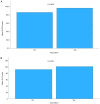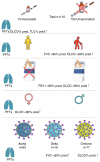Lung function at three months after hospitalization due to COVID‑19 pneumonia: Comparison of alpha, delta and omicron variant predominance periods
- PMID: 38274344
- PMCID: PMC10809351
- DOI: 10.3892/etm.2024.12372
Lung function at three months after hospitalization due to COVID‑19 pneumonia: Comparison of alpha, delta and omicron variant predominance periods
Abstract
The coronavirus disease (COVID-19) pandemic has already affected millions of individuals, with increasing numbers of survivors. These data suggest that the pulmonary sequelae of the infection may have an effect on a wide range of individuals. The aim of the present study was to evaluate pulmonary function in patients hospitalized due to COVID-19 three months after hospital discharge. A total of 116 patients, 34 females and 82 males, with a mean age of 57.77±11.45 years, who were hospitalized due to COVID-19, underwent pulmonary function testing three months after their hospital discharge. Of these, 83 (71.6%) patients were hospitalized in the period of alpha variant predominance, 16 (13.8%) in the period of delta variant predominance and 17 (14.6%) in the omicron variant predominance period. The mean value of diffusion capacity for carbon monoxide (DLCO)% predicted (pred) was statistically higher in patients affected by the omicron variant (P=0.028). Abnormal values (<80% pred) of DLCO and total lung capacity (TLC) were observed in 28.4 and 20.7% of the patients, respectively. Active smoking was an independent predictor of abnormal values of forced expiratory volume in 1 sec % pred and TLC% pred [P=0.038; odds ratio (OR): 8.574, confidence interval (CI) 1.124-65.424 and P=0.004, OR: 14.733, CI 2.323-93.429, respectively], age was an independent predictor of abnormal values of forced vital capacity % pred and DLCO% pred (P=0.027, OR: 1.124, CI 1.014-1.246 and P=0.011, OR:1.054, CI 1.012-1.098, respectively); and female sex was an independent predictor of abnormal values of DLCO% pred (P=0.009, OR: 1.124, CI 1.014-1.246). Α significant percentage of hospitalized patients due to COVID-19 pneumonia will develop abnormal pulmonary function, regardless of the SARS-CoV-2 variant.
Keywords: diffusion capacity for carbon monoxide; long COVID-19; lung function; spirometry; total lung capacity.
Copyright: © Georgakopoulou et al.
Conflict of interest statement
DAS is the Editor-in-Chief for the journal, but had no personal involvement in the reviewing process, or any influence in terms of adjudicating on the final decision, for this article. The other authors declare that they have no competing interests.
Figures



Similar articles
-
Dynamic changes of pulmonary diffusion capacity in survivors of non-critical COVID-19 during the first six months.EClinicalMedicine. 2022 Jan;43:101255. doi: 10.1016/j.eclinm.2021.101255. Epub 2022 Jan 6. EClinicalMedicine. 2022. PMID: 35018338 Free PMC article.
-
A prospective evaluation of lung function at three and six months in patients with previous SARS-COV-2 pneumonia.Respir Med. 2021 Sep;186:106541. doi: 10.1016/j.rmed.2021.106541. Epub 2021 Jul 10. Respir Med. 2021. PMID: 34280885 Free PMC article.
-
Association between serum ferritin level and decreased diffusion capacity 3 months after the onset of COVID-19 pneumonia.PLoS One. 2023 Feb 16;18(2):e0281249. doi: 10.1371/journal.pone.0281249. eCollection 2023. PLoS One. 2023. PMID: 36795727 Free PMC article.
-
Relationship between pulmonary function and albuminuria in type 2 diabetic patients with preserved renal function.BMC Endocr Disord. 2020 Jul 23;20(1):112. doi: 10.1186/s12902-020-00598-1. BMC Endocr Disord. 2020. PMID: 32703207 Free PMC article.
-
Effects of Exercise Training on Cardiopulmonary Function and Quality of Life in Elderly Patients with Pulmonary Fibrosis: A Meta-Analysis.Int J Environ Res Public Health. 2021 Jul 18;18(14):7643. doi: 10.3390/ijerph18147643. Int J Environ Res Public Health. 2021. PMID: 34300094 Free PMC article. Review.
Cited by
-
Long COVID‑19 and pregnancy: A systematic review.Biomed Rep. 2024 Nov 19;22(1):15. doi: 10.3892/br.2024.1893. eCollection 2025 Jan. Biomed Rep. 2024. PMID: 39624781 Free PMC article.
References
-
- Cascella M, Rajnik M, Aleem A, Dulebohn SC, Di Napoli R. Features, evaluation, and treatment of coronavirus (COVID-19) [Updated 2023 Aug 18]. In: StatPearls [Internet]. Treasure Island (FL): StatPearls Publishing; 2023 Jan-. Available from: https://www.ncbi.nlm.nih.gov/books/NBK554776/. - PubMed
-
- Siafarikas C, Stafylidis C, Tentolouris A, Samara S, Eliadi I, Makrodimitri S, Spandidos DA, Mathioudakis N, Karamichalos P, Papalexis P, et al. Radiologically suspected COVID-19-associated organizing pneumonia responding well to corticosteroids: A report of two cases and a review of the literature. Exp Ther Med. 2022;24(453) doi: 10.3892/etm.2022.11379. - DOI - PMC - PubMed
-
- Georgakopoulou VE, Gkoufa A, Damaskos C, Papalexis P, Pierrakou A, Makrodimitri S, Sypsa G, Apostolou A, Asimakopoulou S, Chlapoutakis S, et al. COVID-19-associated acute appendicitis in adults. A report of five cases and a review of the literature. Exp Ther Med. 2022;24(482) doi: 10.3892/etm.2022.11409. - DOI - PMC - PubMed
-
- Cholongitas E, Bali T, Georgakopoulou VE, Giannakodimos A, Gyftopoulos A, Georgilaki V, Gerogiannis D, Basoulis D, Eliadi I, Karamanakos G, et al. Prevalence of abnormal liver biochemistry and its impact on COVID-19 patients' outcomes: A single-center Greek study. Ann Gastroenterol. 2022;35:290–296. doi: 10.20524/aog.2022.0709. - DOI - PMC - PubMed
LinkOut - more resources
Full Text Sources
Miscellaneous
